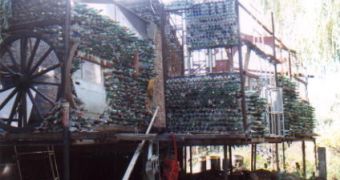We all witnessed the major contribution of pupils who used recycled bottles to replace Kenya's roofs, but this time recycling operations which deal with plastic recipients have reached another dimension.
An African organization managed to highlight the importance of materials considered trash while creating the nation's first house manufactured entirely out of plastic bottles.
Its strategy will stop approximately 14,000 bottles from ending up in local landfills. The process still requires work, since it is only 70% completed.
Despite the fact that skeptics might raise an eyebrow and affirm that this is only a strategy meant to draw the public opinion's attention, the house is actually sustainable, not to mention earth-friendly and original.
The house is there to stay, combining the benefits of cheap recycled materials with the respect for earth-friendly values. The people interested in spotting all the innovative details with their own eyes, the African potential house of the future is located in the Nigerian city of Kaduna.
The entire construction is meant to spread on 58-square metres (624-square feet), providing two bedrooms which give it the appearance of a quite common household, complying with the region's standards.
Despite the fact that the new establishment could function as a traditional home, it will serve a greater purpose. Here masons will be taught the lesson of building a human shelter using only sustainable, cost-effective materials.
The construction started earlier this year, in June, in order to show the authorities that there are earth-friendly option of building a durable home in an environment which is already considerably threatened by polluters.
The establishment relies on a unique system of bottles filled with sand, which are bonded using a mixture of cement and mud. They are also kept in the right position by a network of strings which proved extra hold to the entire structure.
Bottle caps of various colors highlight the fact that sustainability isn't wearing just gray. Experts say that its design isn't everything for the new facility. The house has the ability to preserve a constant temperature of 18 degrees C (64 degrees F), an excellent value for tropical climate.
Also, the place's eco-friendly purpose isn't limited to the fact that manufacturers used recycled material to create it. It is also highly appreciated for the fact that it releases zero carbon emissions into the atmosphere.
The establishment depends only on clean, green solar power and methane produced after deriving human and animal waste compounds.
The construction provides a win-win situation. First of all, it takes thousands of bottles out of the local landfills, where they were condemned to stay for centuries. Secondly, manufacturers have focused their attention on providing a new facility which copes with the authorities' efforts of reducing the households' growing carbon footprint.
“Nigeria has a serious waste and energy problem, and this project is one small step towards making positive changes. Plastic bottles take hundreds of years to bio-degrade in landfills. The project would take 200,000 bottles out of landfills into education,” affirmed Katrin Macmillan, one the environmental activist who struggles to make this project a viable option for the future.
It seems that the entire project took out of the eco-group's pockets two million naira, the equivalent of $12,700. A rather small price compared to the remarkable benefits it brings along.

 14 DAY TRIAL //
14 DAY TRIAL //